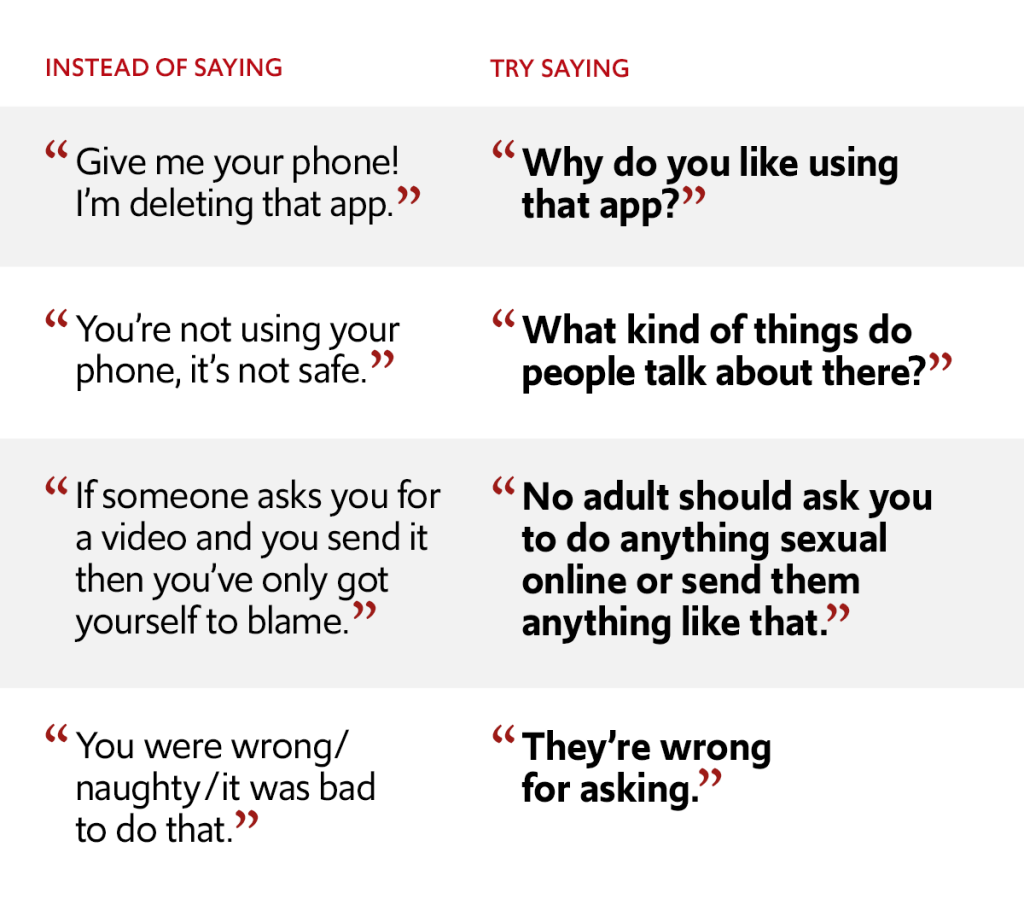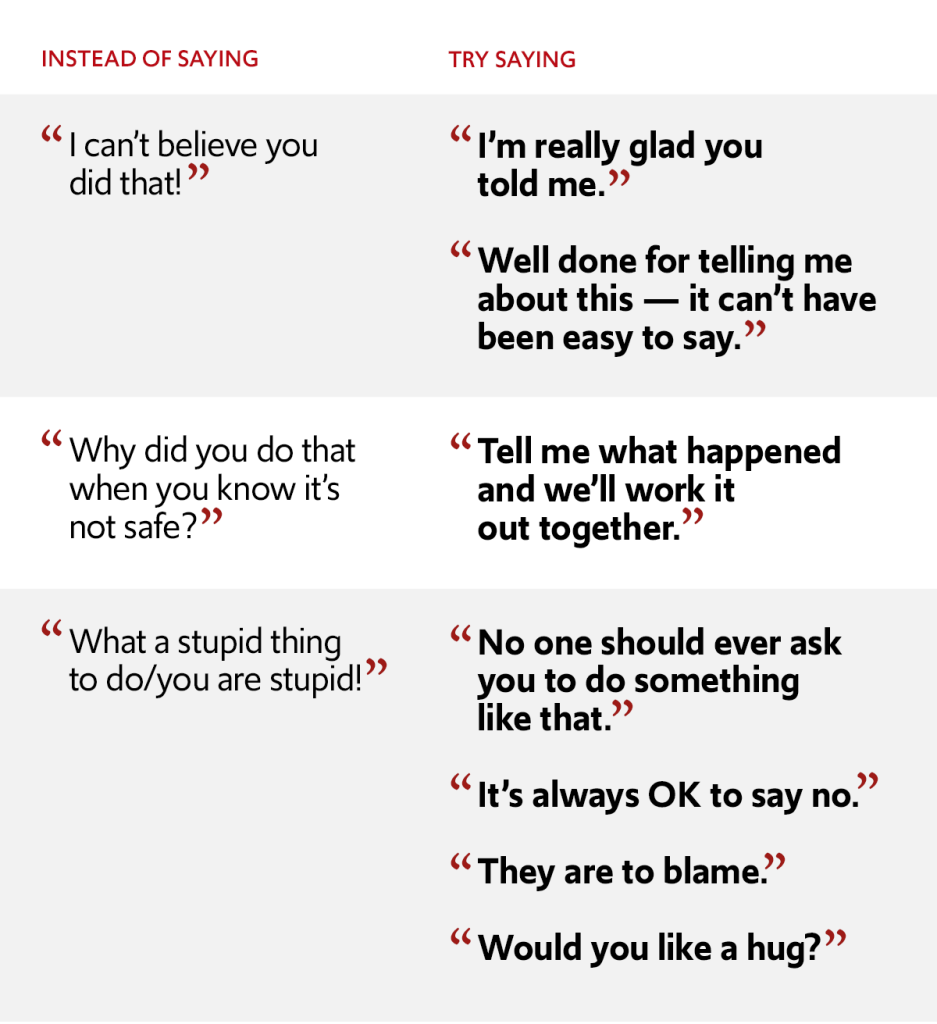Having this first conversation will probably be the hardest thing to do – talking about sex feels awkward, and no-one wants to think about something as shocking as sexual abuse. There won’t be many parents and carers who feel confident or prepared to talk to their child about this – everyone will wish they didn’t have to.
Unfortunately, you do have to. Not talking about it could make the difference between your child being safe, or not. Here are some tips on starting the conversation.
There will never be an ‘ideal’ time to talk about online child sexual abuse, but try and make sure that your child is relaxed and calm, and open to having a chat. If they’re hungry, or tired, or watching their favourite show, the conversation may not go well.
Try not to make a dramatic ‘We need to talk’ statement – a good time to talk about tricky things can be while you’re walking, playing or doing an activity together, or during a car journey. Not having the intensity of being face-to-face or even having to look at one another can take the pressure off and help your child listen, and respond, more easily.
You could also seize an opportunity – for example, if you know their school is teaching about online safety, or the issue is on the news, you could carry on the conversation from there.
Pick your moment, but don’t wait for the ‘perfect’ age or time. It is never too early or too late to have this chat: if your child is getting their first mobile phone, have an age-appropriate conversation (more on this below) before or when they get it. However, if they have been using the internet unsupervised for a while, don’t worry that you have missed the boat – you haven’t.
“There’s a few things we need to talk about now you’re getting/have got your first phone.”
“You can download that app, but first we should have a chat about you being safe while you’re on it.”
“You’re old enough to be on the internet without us needing to supervise you, but there are some things we need to make sure you’re doing to stay safe. This is because…”
Depending on your child’s age, you can give them more or less detail about why this conversation is so essential. However, you do need to describe the issue clearly and in a way they can understand.
It doesn’t need to be long description – for example, the “privates are private” message from the NSPCC PANTS rule is a clear, simple message to use with an 11-year-old. Although it was designed for much younger children, the message is still relevant. (Your child might also have learned this at primary school, in which case you can remind them of it.)
“Your private parts are private, and no-one should ask to see or touch them.”
“Sometimes adults on the internet ask children to send them nude or sexual pictures or videos, or ask to see their private parts. They shouldn’t ask that.”
You can also start a conversation by asking what kinds of safety messages and teaching your child has had at school, and if they know why it’s so important. You can then use what they already know to explain that the same rules apply online.
For older children you can be more direct, using the words ‘online sexual abuse’ and explaining what it means.
“The reason this is so important is because there are people online who ask children to take pictures or make videos which are to do with sex. This is called sexual abuse, and they shouldn’t ask.”
“No adult should ever ask you to do something like this, something that you don’t want to, or that makes you feel uncomfortable, online or offline.”
You might also be worried about the kinds of questions your child might ask, and how you’ll answer these. For example, your child could ask: “What kinds of things might someone ask me to do?”
You don’t have to go into any details, but you could say something like: “They might ask someone to pose in a certain way or do a dance for them.” You can also remind them that no-one should ask them to do anything that makes them feel uncomfortable or that they don’t want to do, no matter what it is.
In the end you, as a parent or carer, will know how to explain things in a way your child will understand. However, it is important not to underestimate them – being honest and talking about why being safe is so important will help them trust you and take seriously what you’re saying. They may be more likely to tell you if they feel worried or unsafe later on.
When you speak to your child, whatever they tell you, never imply that they are responsible or to blame if someone asks them to share, or if they already have shared, sexual material.
The key is to keep communication open, and if your child thinks you are judging or shaming them for what they do, they will be less likely to talk to you honestly, and more likely to behave secretly in future. Be non-confrontational, don’t blame your child, and emphasise that the abuser is responsible for their abuse.
“Give me your phone! I’m deleting that app.”; “You’re not using your phone, it’s not safe.”; “If someone asks you for a video and you send it then you’ve only got yourself to blame.”; “You were wrong/naughty/it was bad to do that.”
“Why do you like using that app?”; “What kind of things do people talk about there?”; “No adult should ask you to do anything sexual online or send them anything like that.”; “They’re wrong for asking.”
If your child does tell you about something that’s already happened:
“I can’t believe you did that!” “Why did you do that when you know it’s not safe?” “What a stupid thing to do/you are stupid.”
“I’m really glad you told me.”; “Well done for telling me about this – it can’t have been easy to say.”; “Tell me what happened and we’ll work it out together.”; “They were wrong to ask you to do that.”; “No-one should ever ask you to do something like that.”; “It is always ok to say no.”; “They are to blame.”; “Would you like a hug?”
Avoid criticising other victims too, whether that’s their peers, people in the news, or characters in shows or films. It may be taken as a judgement on their own behaviour, which can be counter-productive.
When you speak to your child, whatever they tell you, never imply that they are responsible or to blame if someone asks them to share, or if they already have shared, sexual material.
The key is to keep communication open, and if your child thinks you are judging or shaming them for what they do, they will be less likely to talk to you honestly, and more likely to behave secretly in future. Be non-confrontational, don’t blame your child, and emphasise that the abuser is responsible for their abuse.


Avoid criticising other victims too, whether that’s their peers, people in the news, or characters in shows or films. It may be taken as a judgement on their own behaviour, which can be counter-productive.
Some children will find it easier to talk to an adult who isn’t a parent or carer. If you don’t feel able to talk to your child in a way that they will hear and listen, have a think about someone else they trust and respect who might be able to talk to them instead. This could be an older sibling, a relative, a close family friend or a trusted teacher – but let your child have a say in who that person could be.
If you can, have a conversation with that person first, to let them know what they need to talk to your child about, and why.
“I know it’s really difficult for us to talk about this. Who would you prefer to talk to?”; “Do you think X would be a good person for you to talk to?”; “Who do you trust to talk to about this?”
Our downloadable guide for parents and carers.